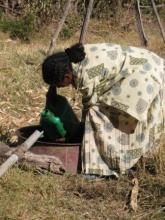Ethiopia: Self-supply family wells for Multiple Use water Services
Ethiopia: Self-supply family wells for Multiple Use water Services
| Title | Ethiopia: Self-supply family wells for Multiple Use water Services |
| Publication Type | Study report |
| Year of Publication | Submitted |
| Publication Language | eng |
| Abstract | Family wells are privately-owned, although generally shared freely with neighbours for domestic use. Traditional hand-dug wells come in a variety of shapes and sizes according to local geology, material availability and know-how. They can be upgraded by stepwise improvements in lining, well head protection and lifting devices. |
| Citation Key | 513 |
| Full Text | Family wells are privately-owned, although generally shared freely with neighbours for domestic use. Traditional hand-dug wells come in a variety of shapes and sizes according to local geology, material availability and know-how. They can be upgraded by stepwise improvements in lining, well head protection and lifting devices. In the case study Self-supply family wells for Multiple Use water Services the author concludes that with the right support, many existing family wells could be upgraded to provide supplies that are better for productive and domestic uses (especially more quantity) and drinking (better quality). This support should keep ownership at the household and improve the convenience, safety (both in terms of water quality and collapsing) and potential benefits of the well. Increased availability of water thus enhances the potential for multiple uses. This potential is high, as the more water systems are owned on private basis, the greater the opportunity to use them for multiple purposes. The case study is part of the MUStRAIN case study series in which the uptake of Multiple Use Services (MUS) in different contexts within Ethiopia is being documented. The case studies analyse cost-benefit relations as well as opportunities and challenges for implementation of MUS. |

